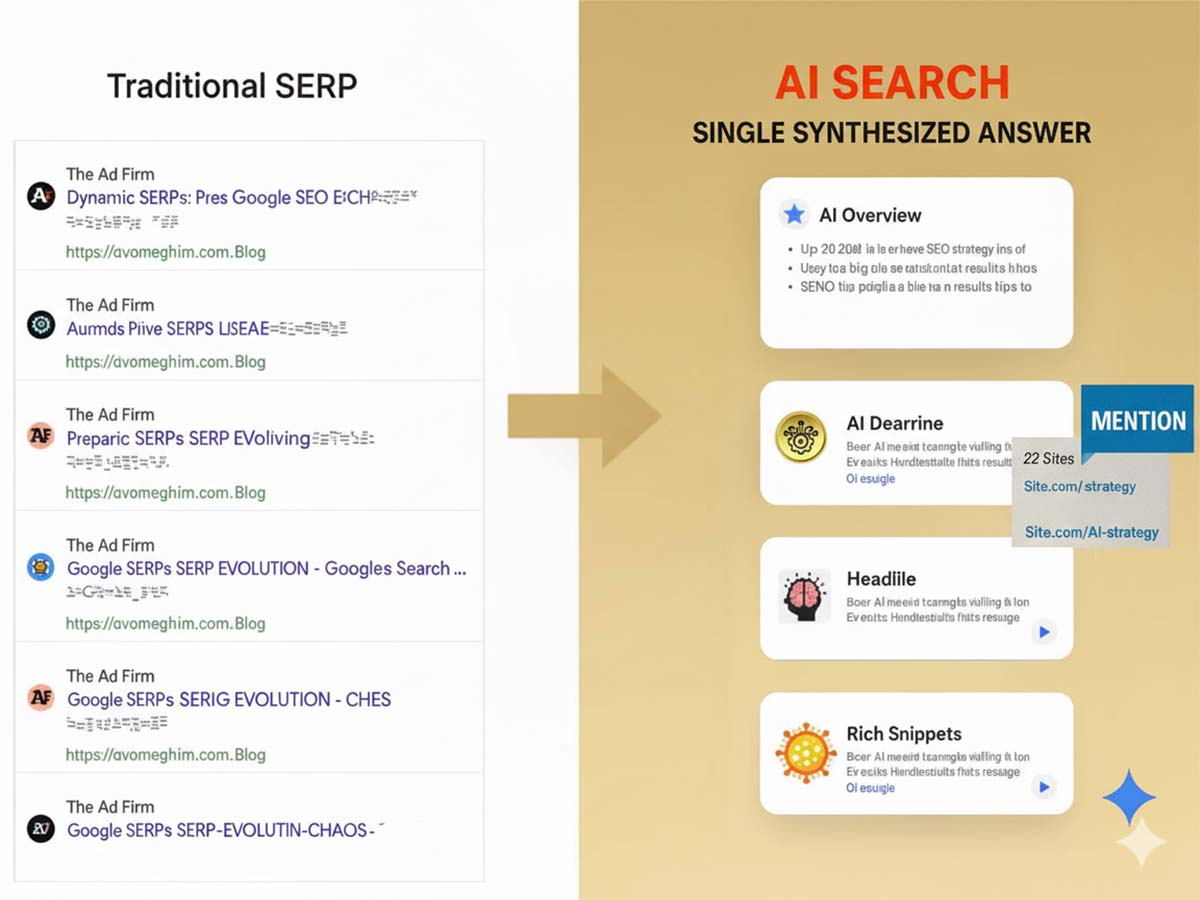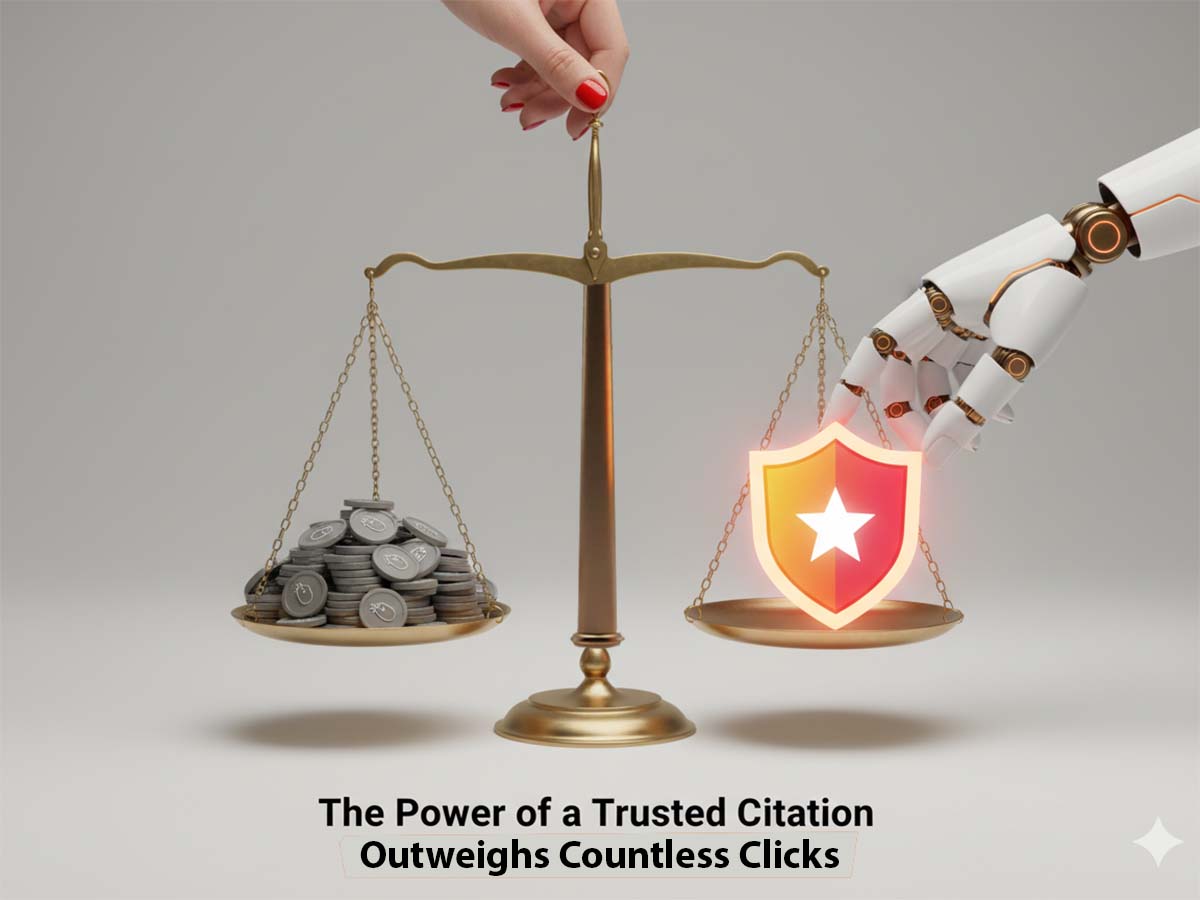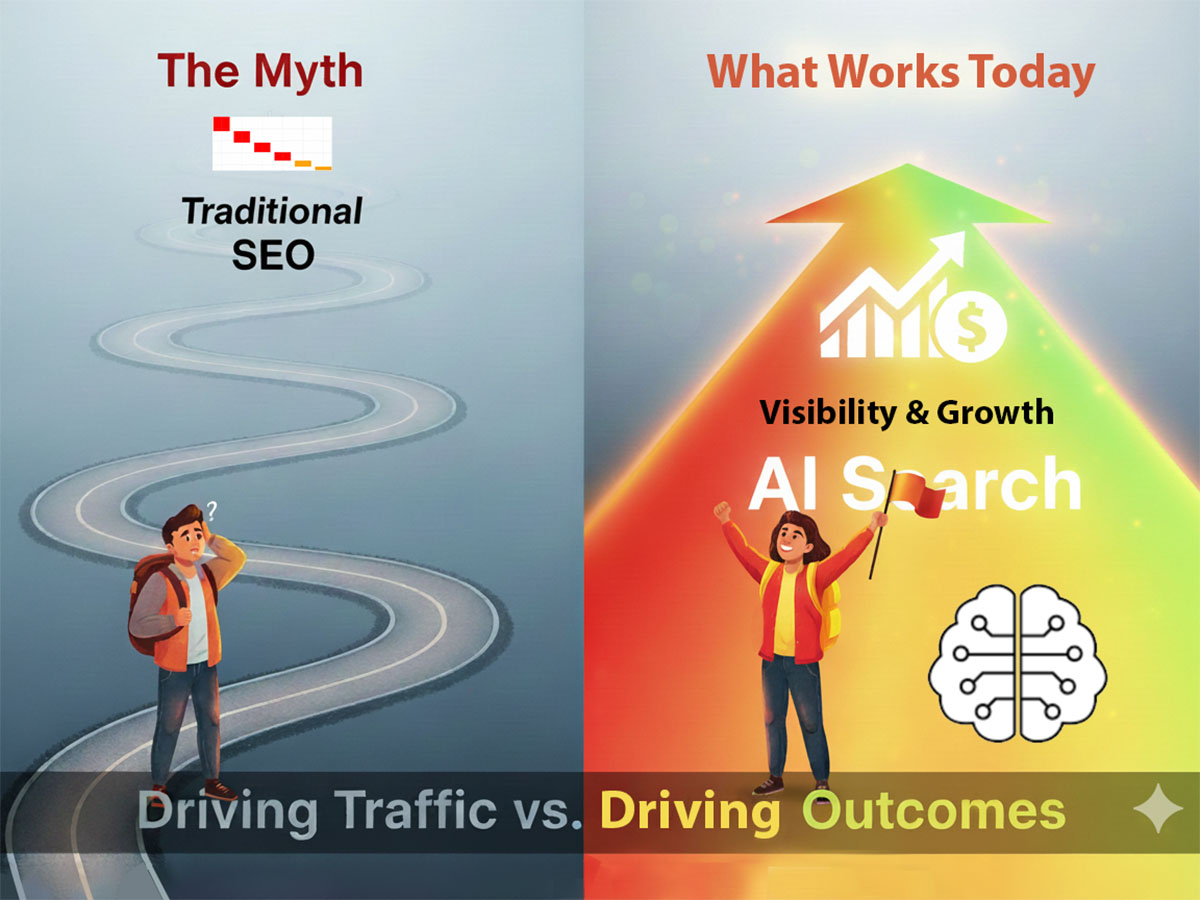Evolving Search: AI SEO Myths That Can Cost You Revenue
The landscape of search is rapidly evolving, and with the rise of AI, so too are the myths surrounding SEO. Clinging to outdated beliefs isn’t just a misstep; it’s a direct threat to your revenue and business growth.
It’s time to separate fact from fiction. AI Search operates on a fundamentally different set of incentives than traditional SEO. This means it is essential to recognize myths and misconceptions.
We see a pivotal shift from driving traffic to visibility that affects outcomes or behaviors. While traditional SEO is incentivized by clicks and website visits, AI Search is driven by the goal of becoming a trusted, cited source within AI synthesized answers.
1. SEO Myth: AI Search is Just Traditional SEO Rebranded
There is a prevalent belief that because AI search engines (like ChatGPT Search or Google’s AI Overviews) utilize information retrieval, the optimization process is identical to legacy SEO. This myth suggests that if you stay the course of traditional SEO, you are inherently optimized for AI surfaces.
It regards “GEO” (Generative Engine Optimization) are unnecessary buzzwords because the tactics (keywords, content, technicals) seem largely unchanged.
I’m coming to see AI Search as a distinct discipline with a unique value exchange. There is a strong tactical overlap between legacy SEO and AI Search; however, thinking the two are one and the same is flawed.

Click here for a full-size example of a an evolving search showing an AI Overview
AI Search is becoming a unique channel operating on:
- Different incentives.
- Technical architectures.
- Success metrics.
Treating AI Search as ‘just SEO’ ignores state-of-the-art information retrieval and creates a significant blind spot, hindering business maturity and revenue opportunities. I’m intent on business maturity and revenue opportunities.
Recommended action:
Holding onto the belief that “it’s just SEO” misses the complexity of our shifting landscape. Face that AI Search is a distinct, emerging surface. Tactics often overlap for now; however, your strategy, measurement, and technical execution required to win are fundamentally shifting.
2. SEO Myth: AI has Rendered Keyword Research Obsolete
The assertion that artificial intelligence will eliminate the need for keyword research is a fundamental misunderstanding of how both AI and search engine optimization are evolving. From an AI SEO expert’s perspective, the reality is far more nuanced. It presents a significant opportunity for revenue growth. AI can augment human intuition with powerful data analysis to achieve unprecedented levels of precision in targeting user intent.
The core of this myth lies in the misconception of keyword research as a simple act of identifying popular search terms. While AI tools are incredibly proficient at processing vast datasets to uncover trending keywords and predict future search patterns, this is merely the foundational layer of a sophisticated SEO strategy. True revenue generation stems from a deeper, more strategic application of search query (keyword) data.
AI isn’t killing keyword research, but revolutionize it.
Recommended action:
- Optimizing for Conversational and Long-Tail Queries: Users are interacting with search as a conversation, meaning the focus has shifted from short, generic keywords to longer, more specific phrases with clear intent.
- Building Topical Authority and E-E-A-T: Demonstrating Expertise, Experience, Authoritativeness, and Trustworthiness (E-E-A-T) will be paramount. This involves creating in-depth, high-quality content that is factually accurate and provides unique insights—qualities that require human expertise and experience.
- Embracing SEO/GEO and Answer Engine Optimization (AEO): Having your content featured and cited within AI-generated answers will be increasingly important. This requires a deep understanding of how to structure content for easy extraction by AI; it’s a task that blends technical SEO with strategic content creation.
3. SEO Myth: You have to have organic web traffic to have sales
Indeed, organic traffic is a vital, cost-effective, long-term asset for building credibility and consistent visibility. But think broader. You can cast a wider net; businesses can generate sales through numerous other marketing channels.
Why the Myth Persists
- High Intent: Users actively searching for solutions have a high purchase intent, leading to better conversion rates on average.
- Long-Term Sustainability: Unlike paid ads that stop at end-of-budget, an effective AI SEO strategy can future-proof you.
- Credibility: Users often trust organic results over LLMs and paid ads. Ultimately, an agile and well-rounded digital marketing strategy blends organic search efforts with other channels to achieve the best operational balance and consistent sales growth.
Recommended action:
Check your robots.txt file: Ensure you are not blocking essential AI crawlers like GPTBot and others. You may be missing clicks if helpful AI crawlers are blocked.
4. SEO Myth: Successful content strategy is about consistent publications
This has a foundation and sustainable truth; but today it also requires context engineering.
A post cannot be measured in isolation or by merely focusing on keywords and fulfilling calendar slots, “Push-to-get-it-done” content models fail. Too often content publications result only in high-cost, low-return content libraries.
Content marketing efforts are more effective if context engineering connects content to a business’s whole content library focused on meeting real user needs.
In 2026, content needs to build equity, engage qualified audiences, and guide people from a point of intent to conversations, and a point of conversion. It involves the use of a knowledge graph to structure and deliver digital content, making it more organized, accessible, and easily discoverable, by AI applications.
Good content creation views text not as a static, linear entity, but as a dynamic, multi-layered environment for interaction and co-created meaning.
Recommended action:
- Include Real-World Experience: AI models learn from existing online data; they lack your personal experiences and expertise. Infuse your content with unique anecdotes, first-hand case studies, and proprietary data that AI simply cannot replicate. This human element is what builds trust and authority.
- Refine with Iterative Prompts: Rinse and repeat your prompt engineering skills with custom Gemini Gems that assist content creation.
- Provide Dynamic Answers: Focus on content relevance engineering and contextual meaning over static content.
- Fact-Check and Cite Sources: AI may “hallucinate,” have errors, or present outdated information. Every claim, statistic, or piece of data generated by AI must be rigorously fact-checked by a human expert. Cite facts and authoritative sources for your claims and to support your opinions.
5. SEO Myth – LLMs have stolen most organic clicks
In short, AI is a major disruptor that erodes the portion of organic clicks. However, organic search remains a vital channel, and effective AI SEO can adapt to this emerging landscape.
A Statistical Look at How LLMs Impact Clicks
- CTR Decline: It’s become indisputable that traditional organic listings see a measurable drop in CTR if Google’s AI Mode operates. Position 1 organic results can see their clicks plummet by over a third (around 34.5%) when an AI Overview is present.
- Zero-Click Searches on the Rise: AI Overviews provide direct instant, synthesized answers which satisfy the user’s query without a click-through to a website. This contributes to the increase of “zero-click searches”.
- LLM Traffic is a Small Percentage (For now): While AI traffic is growing with a 527% increase in AI-referred sessions in early 2025) it remains a small fraction of overall traffic. Often less than 1% of sessions compared to approximately 32% from organic search.
- Organic still dominates in conversions: CRO studies signal that traffic from traditional organic search generally produces higher engagement and better conversion rates than traffic from LLM referrals. LLMs are often used for early-stage information research, then the buyer typically goes to Google Search for the purchase.
Recommended action:
The key is building structured knowledge that AI easily processes and can apply. Instead of designing your content for clicks and views, focus on creating journeys that help users complete tasks through the systems guiding them.
6. SEO Myth: It is Safe to Block all AI Traffic
Blanket blocking of AI traffic is generally not recommended. It can negatively limit your website’s visibility and functionality.
While blocking malicious AI bots is beneficial, legitimate AI traffic includes important functions like search engine indexing and Retrieval-Augmented Generation (RAG) systems that serve information to users.
AI bots, like Google-Extended and Applebot-Extended, now function in major search engines’ crawling processes. Blocking these can prevent your content from appearing in AI-powered search results and general search functions. Blocking all AI bots can trigger a significant drop in organic traffic.
Recommended action:
Check your robots.txt file: Ensure you are not blocking essential AI crawlers like GPTBot and others. You may be missing clicks if helpful AI crawlers are blocked.
Leverage LLM.txt advanced uses: I’ll simply refer readers to Crystal Carter’s published article: 5 real-world LLMs.txt use cases we should be talking about
7. SEO Myth: Implementing schema markup has less value in Agentic AI
The myth that “Implementing schema markup has less value in Agentic AI” is contradicted by the foundational data needs of AI systems and the reliance of AI search on traditional SEO signals.
- Semantic metadata is essential for AI Retrieval and trustworthiness
- Valid schema seo reduces ambiguity and the likelihood of LLM hallucinations.
- AI Search relies on existing search indices and traditional SEO
- Google confirms that Schema is a core, established SEO fundamental.
The truth is that Knowledge Graph’s are becoming your storefront.
Recommended action:
Hire an expert who understands that 𝘆𝗼𝘂𝗿 𝘀𝗲𝗺𝗮𝗻𝘁𝗶𝗰 𝗱𝗮𝘁𝗮 𝗹𝗮𝘆𝗲𝗿 can be your new distribution channel. Have a schema markup audit done by a professional not just a tool.
8. AI SEO Strategists don’t need involvement in Google’s Merchant Listings
The thinking that e-Commerce is little helpless with AI is starting to wane as the per-for-exposure conversations and their effective mechanics are becoming clearer. OpenAI’s publication of product feed schema highlights the on-going importance of eCommerce schema markup.
SEO functions and management in Merchant Feeds have an “organic” role. Google Merchant shopping results reward catalogues that rank and are technically sound.
The Google Merchant Center is a significant sales opportunity because it increases product visibility across Google’s platforms. It’s AI technology enables more customers to discover and purchase your products. It acts as a gateway to Google Shopping ads and free listings.
Recommended action:
Hire an expert AI SEO strategist who has skills with the Merchant Center performance, optimization, and data-driven sales.
9. SEO Myth: Agentic search activity runs locally and is easier for browsers to fix
The current and future landscape of browser technology and cybersecurity involves intricate architecture of agentic AI systems. They introduce novel security challenges. Agentic search is a paradigm shift, not a simple, localized feature with straightforward fixes.
Local vs. Cloud Execution: While some specific niche or open-source “agentic” tools and extensions can run locally for privacy or performance, the primary development of major agentic AI features (e.g., from Google and Microsoft) often involves a mix of cloud services and local integration.
Running models locally offers privacy benefits, but it does not inherently make security issues “easier” to fix across the board.
I’ve been involved in many intelligent conversations on the topic of AI SEO myths. I’m grateful for the many experts who have written about them sufficiently. I’ll briefly list a few of them.
Additional Common AI SEO myths in 2025:
- AI content will automatically trigger a penalty.
- AI can completely replace human SEO strategists.
- AI-generated content will destroy your brand authenticity.
- Retailers can only sell off their website. (AI shopping occurs on Merchant Listings)
- SEO is dead.
In my findings, SEO is more needed than ever. Search engines prioritize helpful, high-quality content regardless if AI tools are part of the production. AI is a useful tool for research, automation and analysis; it is not a complete replacement for human strategy, creativity, and brand building.
Tables are great for summarizations and comparisons. Here are key article takeaways.
Comparing Core Incentives of AI Search vs. Traditional SEO
| Core Distinction | AI Search (GEO) | Traditional SEO |
|---|---|---|
| 1. Being the Cited Source, Not the Clicked Destination | Be the Answer: Win by being cited, or mentioned, and influencing the user directly within the AI’s response. | Be the Destination: Win by ranking high to earn a click and drive traffic to your website. |
| 2. Content Strategy | Optimize for Synthesis: Create content that is easily digestible, fact-dense, and structured for an AI to parse and integrate with information from other sources.
The goal is to become the trusted passage answer that AI constructs for the user. |
Optimize for a Page UX: Making a single webpage the most authoritative and often clicked destination for a specific query.
The focus was more on convincing search engines that your page, as a whole, is the best, with a goal of ranking. |
| 3. Role of Authority | Authority as Validation: Build trust so the AI validates your brand as a credible source *within the answer*. | Authority for Ranking: Build authority (e.g., backlinks, full focused on the website) primarily as a tool to achieve a higher rank. |
| 4. “Zero-Click” Environments | An Opportunity: Embracing new opportunities to shape brand perception and user understanding without needing a click.
Gaining visibility even when users get their needs met without leaving the search platform. |
A Threat: The mindset that AI Search is nn obstacle.
The primary incentive of traditional SEO is to avoid being a zero-click result by enticing the user to click through for more information. |
| 5. New Value Exchange | The new incentive is to find value in today’s disrupted ecosystem.
This may involve focusing on brand awareness, influencing commercial decisions even without a direct sale, and ensuring your brand’s narrative is accurately reflected in AI summaries. |
The incentive is to operate within the established value exchange.
The strategy is largely based on the idea that creating high-quality, optimized content will be rewarded with referral traffic, which can then be monetized. |
Before concluding, let’s sum up a few ways to constructively use AI.
How to Create AI-Assisted Content That Search Engines Love
I think of it as less about if I use AI, and more about skill sets to leverage AI. For example, it can help the content writer create narratives that genuinely serve the user. Think of AI not as a content creator, but that it can be a useful co-pilot and content assistant.
AI tools and platforms can accelerate content creation through:
- Topic research.
- Audience needs.
- Creating structure drafts.
- Automating tedious tasks.
- Freeing time for focusing on how to add unique value.
Is your traditional SEO strategy failing in AI search? Align with the above debunked critical myths about content, traffic, and schema. Learn the new incentives—from clicks to citations—to protect your revenue.
Know What AI SEO Myths to Debunk and Adapt Your Marketing Plan
Let us know what your biggest challenge with content in the age of AI. If you need an SEO Maketing Plan with AI measurement for the coming year, we can help! Call 651-206-2410
Partner with Hill Web Marketing to Increase Your Visibility in AI Answers
